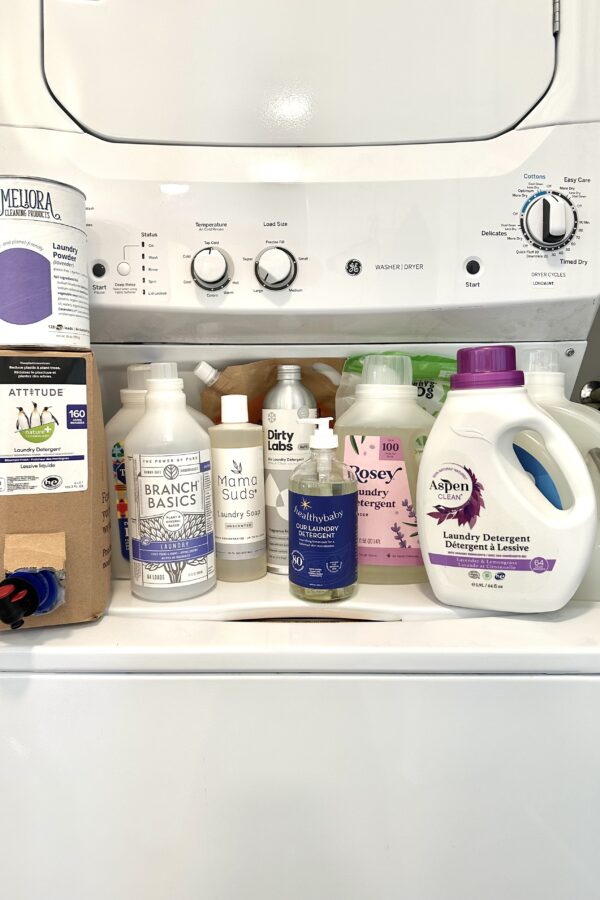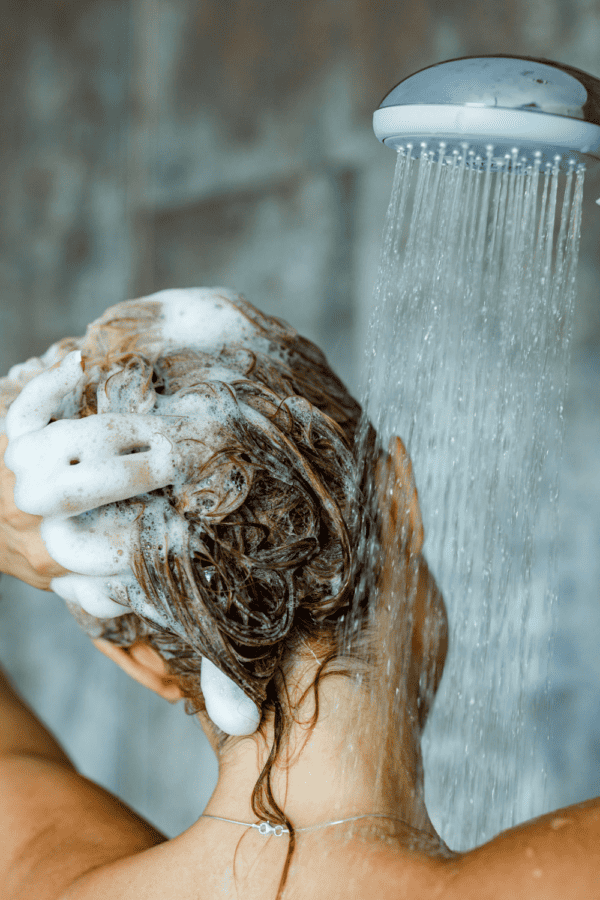Ants, fruit flies, mosquitos, ticks, and other bugs and insects… They can be a nuisance. Even though insects are important for a healthy ecosystem, the reality is that you don’t want them invading your home or yard, and you don’t want them bothering your pets. So what can you do?
Not surprisingly, many of the conventional pesticides that are commonly used in and around homes are bad for your health, your pets, and the environment.
Fortunately, you can choose non-toxic pest control solutions that are green, eco-friendly, plant-powered, and natural. Most importantly, they are safe for you, your body, your pets, and our environment.
It doesn’t have to be expensive either. You can access some great non-toxic pest control options on a budget.
Navigating all of the non-toxic pest control solutions out there can be difficult. There are so many options, but we are here to help. We’ve done our research and are ready to save you some time. Here we’re sharing the best non-toxic pest control solutions for 2023.
Table of Contents
- Safer Pest Control Solutions In a Nutshell:
- The Problem with Conventional Pest Control Solutions
- Use Preventative Strategies to Keep Bugs Away When Possible
- A Quick Disclaimer About Non-Toxic Pest Control
- Here Are the Best Non-Toxic Pest Control Brands
- Wondercide (Best Overall: Indoor, Outdoor, & Pets)
- Flea & Tick Spray for Pets + Home with Natural Essential Oils
- Ready-to-Use Yard Spray for Mosquitos, Ants, & Ticks
- Flea & Tick Collar for Dogs + Cats with Natural Essential Oils
- Aunt Fannie’s (Best for Indoor Pest Control)
- Sunday (Best for Tough Jobs)
- Other Great Non-Toxic Pest Control Options
This article contains affiliate links, which means we may earn a commission if you decide to make a purchase.
Featured Image Credit: Wondercide
Safer Pest Control Solutions In a Nutshell:
- Best Overall (for Pets, Indoor, & Outdoor): Wondercide
- Best for Inside: Aunt Fannie’s
- Best for Tough Jobs: Sunday (see below for a couple of precautions)
The Problem with Conventional Pest Control Solutions
Conventional pest control solutions often involve harsh pesticides. According to the U.S. Department of Health and Human Services (HHS), we use about 1 billion pounds of pesticides in the United States alone (1). Considering the toxic health effects and environmental impact of many conventional pesticides, this is concerning. Obviously, a large portion of those pesticides are used in agriculture, but they’re also widely used in home, building, and yard management as well.
Pesticide exposure can have many acute and long-term negative health effects, which vary depending on the actual active ingredient(s) being used.
Acute pesticide exposure may cause rashes, blisters, eye irritation, dizziness, nausea, diarrhea, and more. Long-term term complications and the effects of chronic exposure to pesticides may include gut microbiome imbalance, hormonal imbalance, endocrine issues, diabetes, autoimmune issues, neurological problems, developmental toxicity, immunotoxicity, immune health issues, oxidative stress, and cancer. Pesticides may also negatively impact your pets, causing vomiting, diarrhea, dizziness, convulsion, dizziness, respiratory issues, and other health problems (2, 3, 4, 5, 6, 7, 8, 9, 10).
Synthetic pesticides can negatively affect your environment as well. They can lead to soil nutrient depletion and, as a result, the nutrient content of our food. It may affect our bee and butterfly colonies and other pollinators. It may impact our birds and even some non-flying animals, including animals raised for meat and eggs in the area (11, 12, 13, 14).
Use Preventative Strategies to Keep Bugs Away When Possible
Instead of using toxic, conventional pest control strategies, we recommend more natural and organic pest control. Some of the solutions below are meant to actually kill bugs, while others are meant to discourage bug infestations in a more preventative way. With the help of herbal solutions, essential oils, and other natural substances, they help to reduce the risk of pest infestation and remove pests safely and effectively.
There are various preventative measures you can take to prevent bugs from becoming a problem in the first place. Here are some pointers:
- Keep your home clean.
- Don’t leave food out for long periods of time and clean up spills right when they happen.
- Manage the garbage: take it out regularly, keep it in covered bins, and clean your cans every once in a while.
- Close off pest entry points. For example, fix holes in window screens and keep caulk cracks filled.
- Bathe pets regularly and check them for fleas and ticks.
- Don’t store wood inside.
- Manage any standing water around your home. Think about pools, bird baths, or swampy areas of the yard.
- Consider using natural bug-control predators like bats!
To learn more about organic pest control strategies in your yard and garden, Epic Gardening has a great collection of resources here. And here are some more tips on how to implement integrative pest management (IPM) strategies in your home.
A Quick Disclaimer About Non-Toxic Pest Control
Even though the products below are much safer than conventional pest control strategies, you should still keep in mind that many pest control solutions are still meant to kill living things. You should always follow the directions carefully, only use pest control when you actually need to, and do not over-apply the solutions.
If you, your family members, or your pets have any specific health concerns or allergies, don’t be afraid to check with your doctor and/or vet to be sure your chosen solution is suitable for your living space. If you’re trying a product for the first time, you may want to use a small amount at first in order to make sure no one has any adverse reactions.
RELATED: Here are the best non-toxic citronella candles to keep mosquitos at bay
Here Are the Best Non-Toxic Pest Control Brands
Now that you understand the problem with the majority of conventional pest control options and the importance of natural alternatives, let’s get into the best non-toxic pest control solutions available in 2023:
Wondercide (Best Overall: Indoor, Outdoor, & Pets)

You may be familiar with Wondercide from Shark Tank. The founder of the company started her journey with natural pest-control solutions when her beloved dog, Luna, got sick from pesticide poisoning from conventional flea-and-tick control. Since nothing natural was working for them on the market, they decided to make their own product. It worked… and now, it can work for you too.
Wondercide offers plant-powered, natural protection from ticks, fleas, ants, mosquitoes, roaches, and other bugs or insects. Even though their primary focus is on pet pest control, they offer solutions for both humans and pets, inside your home and on the go.
They offer bundles and trial boxes, too.
Their products are:
- plant-powered
- cruelty-free
- USA-made
- lab-proven
- offering a whole-family protection
Price range: $13.99 – 82.00
Just a quick note that many of their products do contain sodium lauryl sulfate (SLS), which some people may choose to avoid. While SLS is not concerning in terms of endocrine disruption or cancer, it can be a skin irritant for some. So you may just want to pay attention to whether or not your pet’s skin reacts to the solutions, and discontinue use if it does.
Some of their products include:
Flea & Tick Spray for Pets + Home with Natural Essential Oils

Price: $13.99
Sents: lemongrass, cedarwood, peppermint, and rosemary
This is an easy-to-use plant-powered flea-and-tick spray that you can use in your home and on your pets to prevent ticks, fleas, and other unwanted insect infestation and bites. Made with natural essential oils like cedarwood and lemongrass, it offers a natural and fresh scent. It’s safe for cats and dogs.
Ready-to-Use Yard Spray for Mosquitos, Ants, & Ticks

Price: $37.99
Wondercide has various solutions for your yard and the permitter of your home. For example, this plant-powered yard spray for your yard to prevent ticks, fleas, mosquitos, and other bugs naturally. Most importantly, it is safe for butterflies and bees to support pollination! It’s also safe for your other plants and pets. You can attach a hose or spray to the bottle and cover up to 5,000 sq ft.
Flea & Tick Collar for Dogs + Cats with Natural Essential Oils
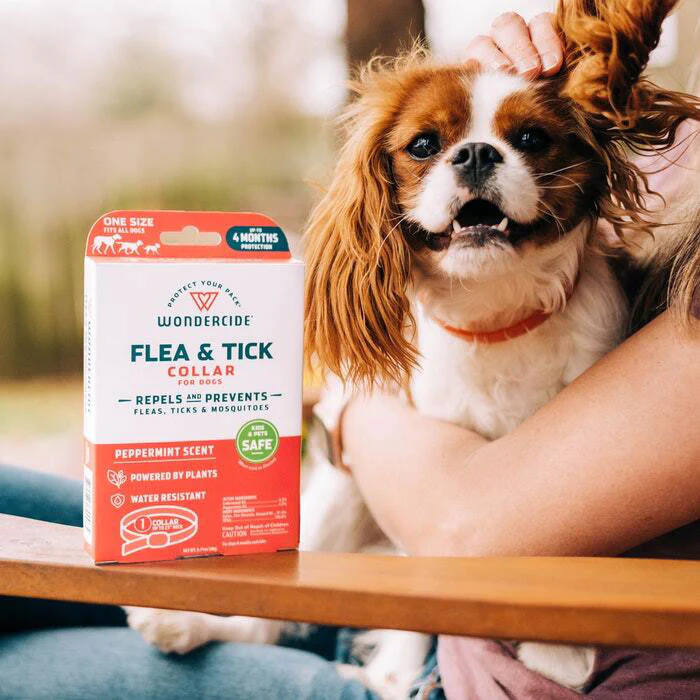
Price: $19.99
This is a natural flea-and-tick collar made with peppermint essential oil that offers natural and non-toxic protection against fleas and ticks for up to 4 months. It also offers mosquito protection for up to 1 month. It comes in one size that fits most pets, for dogs up to 23″ neck and for cats up to 13″ neck, 4 months or older.
Other products to consider:
- Indoor pest control spray
- Fruit fly traps
- Wasp & hornet spray
- Ear care for dogs & cats
- Dog & cat shampoo
- Ant & roach spray
- & more!
Aunt Fannie’s (Best for Indoor Pest Control)
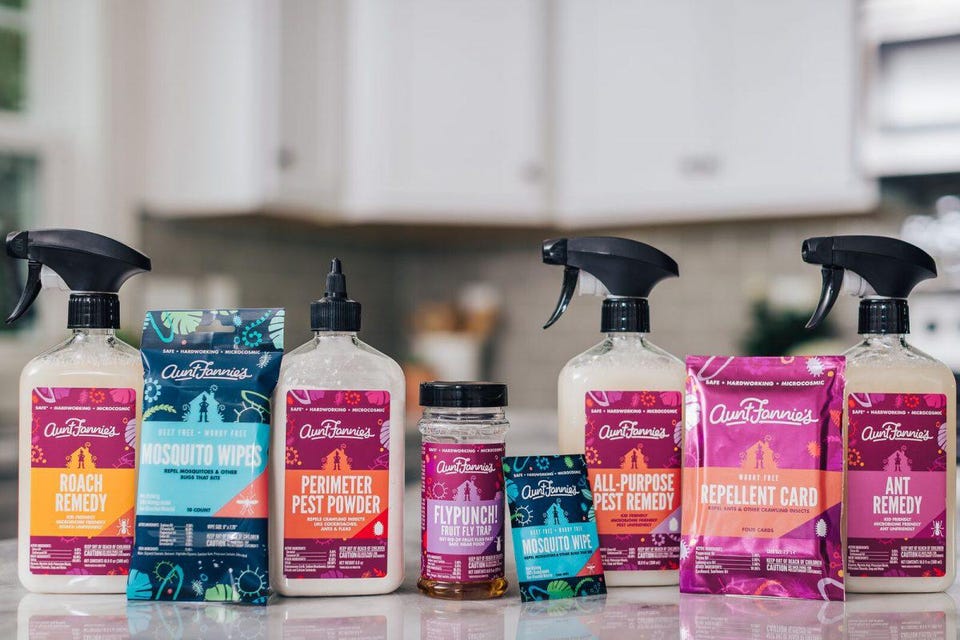
Aunt Fannie’s offers affordable, people-friendly, and pet-friendly natural solutions for your home. They have a wide selection of non-toxic pest solutions products. They also offer other natural and hypoallergenic cleaning products and pet products. They aim for the highest standards of wellness in home care for you and your loved ones.
Their products are:
- free from harsh chemicals
- cruelty-free
- USA-made
- made with functional essential oils
Price range: $7.99 – 10.99
You can buy Aunt Fannie’s at: Grove Collaborative | Hive | Target
Some of their products include:
FlyPunch! Fruit Fly Trap

Price: $7.99
This flytrap is their best-selling product. It’s made with a unique blend of specialized vinegar and ferment, without petrochemicals or harsh ingredients. It’s easy to use and safe in your kitchen or near food prep areas. A must for your kitchen compost, gardeners, home brewers, CSA lovers, and in your home in humid weather.
Ant Remedy
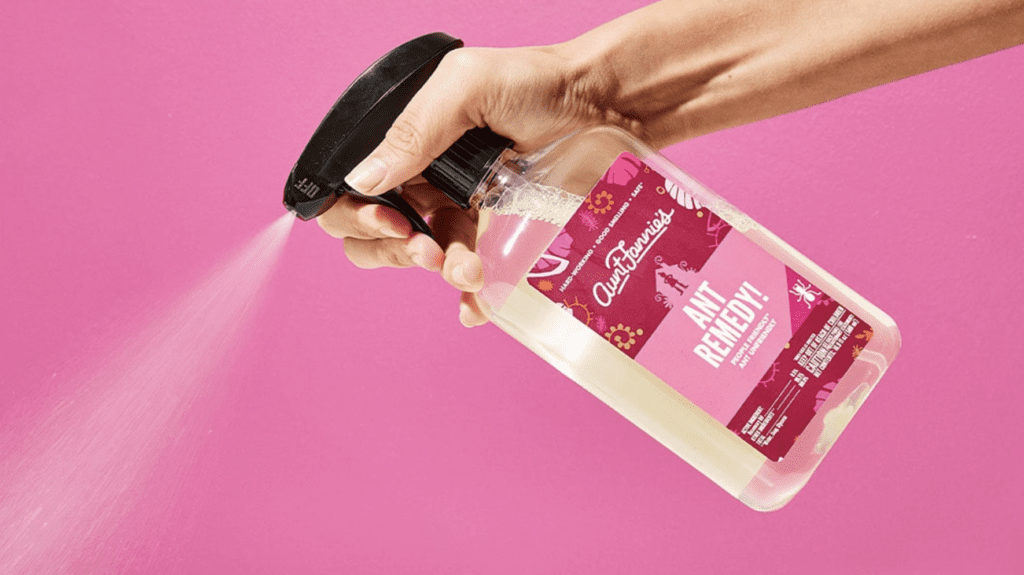
Price: $10.99
This is an effective natural remedy to keep ants away without harsh chemicals. Just spray it directly on the ant or the areas they are around. You don’t have to worry about any odors — it actually smells good.
All-Purpose Pest Remedy

Price: $10.99
This is the perfect product if you are looking for an all-purpose pest remedy to use around the house. It is a great, effective, and natural solution for ants, roaches, and other bugs around the house. Powered by essential oils, it smells great without unnatural fragrances.
Other products to consider:
Sunday (Best for Tough Jobs)

Price range: $22 – $115
Sunday offers effective solutions for your garden, including pest control, lawn care, fertilizers, gardening tools, trees, shrubs, and more. Disheartened by the toxin-filled products at their local home improvement store, Sunday’s founder wanted to create better lawn care options for their little plot of land, which eventually grew into a company.
Be aware that Sunday’s active ingredients are stronger than those used by the above brands, and therefore might not be the best choice for everyone. Even though their ingredients are plant-based and/or OMRI-listed for organic gardening, a couple of them are controversial. The two ingredients to be aware of are pyrethrin and spinosad.
Pyrethrin is sourced from chrysanthemum and is generally recognized as safe for organic gardening by the Organic Materials Review Institute (OMRI). Some forms of pyrethrin can be toxic to bees and pollinators. There is some indication that they may contribute to endocrine disruption in humans, although there is very little research on this. There is concern about allergic sensitization as well.
Spinosad is a biopesticide derived from a naturally occurring soil bacterium. It can be slightly toxic to humans and could lead to eye or skin irritation. It’s also toxic to bees, so if you do use it, you should be sure to use the best practices explained here.
For these reasons, we recommend using these products sparingly, and only when you have a true infestation and other products may not be working.
Additionally, be sure to check the FAQs on the specific product pages because some of their products are not approved for use in every state.
Some of their products include:
Ant Adios Insect & Ant Killer

Price: $22
This product offers protection against crawling insects, including ants, pillbugs, crickets, sowbugs, cutworms, and more. It offers targeted protection but also perimeter use.
Active Ingredient: spinosad
Nix Ticks

Price: $27
This is an easy-to-use product for natural tick protection made with cedarwood essential oil. It helps to kill ticks and their larvae. It also offers protection against fleas and mosquitos for four weeks in dry areas. It is biodegradable and completely safe for humans, pets, and our planet. And it smells great — just like a walk in the woods!
Active Ingredient: Cedarwood oil
Mosquito Deleto Bug Control Spray & Repellent

Price: $27
This ready-to-use spray kills mosquitoes, fleas, and ticks on contact, but also repels new pests, too. It uses natural oils instead of synthetic pesticides. It’s easy to apply in about ten minutes—just hook it up to your hose and spray.
Active Ingredients: Cedarwood and lemongrass oil
Other products to consider:
- Fire Ant Fighter (active ingredient: spinosad)
- Backyard Pest Protection Pack
- Total Home Pest Protection Plan
Other Great Non-Toxic Pest Control Options
Sticky Traps

Sticky traps like these offer a clever and simple option for flies and other flying insects. Flies are naturally attracted to these traps if you place them in visible areas with light. Since they are made with sticky materials, they trap flies and insects. They get stuck, are unable to fly away, and eventually die. Sticky traps are completely safe to use. They are great options in your kitchen, around your home, in the barn, or even outside by your picnic table.
Fruit Fly Traps
Fly traps are great if you want to keep fruit flies away from fresh fruits or other food sitting on the counter. Though you can make your own low-cost fruit fly trap from recycled bottles, if you want something stylish and decorative, go for a beautiful ceramic or glass fruit fly trap. It will look like a cool decoration on your kitchen counter.
Some good options for fruit fly traps:
- Soapstone Box with Two Fruit Fly Traps
- Minimalistic White Fruit Fly Trap
- Glass Apple Fruit Fly Trap
- Elevated Lifestyle Fruit Fly Trap
Zappers

Zappers use UV lights to attract and then kill mosquitoes, flies, and other flying insects. They are popular options in outdoor settings in your garden, balcony, or other outdoor gathering places. However, some zappers can be used indoors too, offering a great solution for indoor flying insect issues. Just remember that UV light can be damaging to the skin, so humans should not be close to these zappers for long periods of time.
Some good options for zappers:
- Flowtron BK-40D Electronic Insect Killer for Outdoor Use
- ASPECTEK Powerful 20W Electronic Indoor Insect Killer, Bug Zapper, Fly Zapper, Mosquito Killer-Indoor Use
- GLOUE Bug Zapper Light Bulb, 2 in 1 Mosquito Killer Lamp UV Led Electronic Insect & Fly Killer
Flea Traps

We love our pets, but they can carry and spread unwanted creatures that may end up taking residence in your carpet, bedding, and other areas of your home. Using a non-toxic, odorless flea trap like this one is a simple option for pet owners to prevent flea issues.
Bed Bug Traps

Nobody wants bed bugs. Their bites are itchy and slow to heal. Not to mention that infestations are hard to get rid of. Fortunately, you can use eco-friendly traps like these thunder your bed and by the legs of your furniture to stop them in their tracks without chemicals.
You can also try Aunt Fannie’s Bed Bug Powder.
Instead of harsh synthetic pesticides, protect your home, your health, your pets, and the environment with these eco-friendly, natural, and non-toxic pest control solutions.
To get more tips, product picks, and exclusive content you won’t find anywhere else, sign up for Filtered Fridays.

